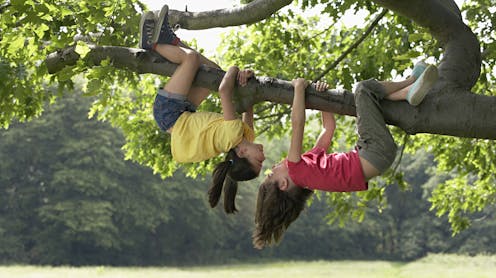Detta inlägg post publicerades ursprungligen på denna sida this site ;
Date:
Author: Adele Doran, Principal Lecturer/Research & Innovation Lead, Sheffield Hallam University
Original article: https://theconversation.com/playing-and-exploring-outdoors-brings-risk-and-thats-good-for-children-249538
We are currently in the midst of a youth mental health crisis. In 2023 in England, a fifth of children aged eight to 16 had a probable mental disorder.
One way to address children’s wellbeing is through letting them take part in outdoor risky play.
When climbing trees, building dens, riding a bike fast, constructing rafts to float on water, or exploring a woodland, children make their own decisions on which risks to take and which to avoid. This empowers children to be decisive and independent in other situations, such as in their transition to secondary school, rather than relying on adult prompting or direction.
Progressive incremental exposure to uncertainty and risk builds resilience and enhances overall wellbeing in young people. In our own research with 622 teenagers, we used questionnaires to measure their resilience and wellbeing before and after taking part in an outdoor adventure education residential trip. We found that their scores for wellbeing increased by 23%, their resilience by 36%.
Outdoor risky play supports experimentation and exploration. It helps children develop social skills such as turn-taking and cooperation, and so gives them tools to overcome future challenges. It nurtures their curiosity. Children can be revitalised by being in nature, and by the adventurous uncertainty of playing without rules and restrictions.
Forest school and residential trips
One way children can play in this risky way with the support to build a healthy relationship with nature and risk is through regular attendance at a forest school.
The forest school is a form of outdoor education where hands-on learning takes place in a woodland environment. It offers the chance for children to connect with nature, experience risk, build social skills and be active in their learning. This may include activities such as cooking on a campfire, doing nature-based arts and crafts, or building a den. It can be a weekly activity that children take part in for a few hours.
Longer residential trips offer an extended opportunity to experience aspects of learning outdoors. These might be organised by a school or club, and include a variety of activities, such as orienteering, rock climbing, abseiling, and land and sea expeditions. These are aimed at developing leadership skills, resilience, autonomy and confidence. Children are challenged by exploring unfamiliar environments.
Sergey Novikov/Shutterstock
However, in order to be beneficial, risky outdoor play needs to be frequent, progressive and to take place throughout a child’s education. The benefits it provides cannot be achieved with a one-time forest school or residential experience.
One option would be to make forest school and outdoor play a regular part of children’s school education.
But the current schooling system in the UK and – in England – the school qualities valued by Ofsted do not support the holistic development of children. A school’s worth is primarily measured by attendance and attainment in a limited number of core subjects. Few opportunities exist for schools to implement a range of activities that purposefully boost and sustain learners’ wellbeing and encourage risky play.
A shift in thinking is required for schools to recognise the worth of outdoor risky play, and for teachers to be empowered to embed the culture of educated risk-taking within and beyond their school gates.
There have been calls in the Welsh and Scottish governments for a universal entitlement to a weeklong residential trip. Campaigns in England have called for all children to be guaranteed time in nature. But actual progress towards a goal of broadening opportunities for accessing outdoor activities and experiencing risky play is glacial.
At a point in time when children have faced unprecedented upheaval and threats to their wellbeing, it has never been more important to create daily opportunities for them to build their ability to deal with uncertainties. Experiencing the outdoors and positive risk-taking are fundamental to the everyday lives of all young people.
The authors do not work for, consult, own shares in or receive funding from any company or organisation that would benefit from this article, and have disclosed no relevant affiliations beyond their academic appointment.
